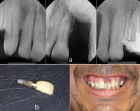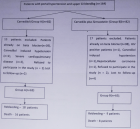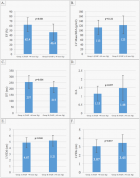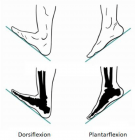Abstract
Research Article
Agro-morphological Growth Response of Acha (FONIO) (Digitaria exilis and Digitaria iburua [kippist] Stapf.) Exposed to Colchicine: Number of Spikes, Spike Length, Number of Seeds per Spike and Grain Yield
Nyam DD*, Gonzuk NS, Sila MD, Tumba YC, Angyu EA and Kwon-Ndung EH
Published: 06 August, 2024 | Volume 8 - Issue 2 | Pages: 113-117
This study aimed to investigate the effects of colchicine treatment on the reproductive traits and grain yield of two species of Acha, Digitaria exilis and Digitaria iburua. Colchicine, a mitotic inhibitor, is known for inducing polyploidy and altering plant characteristics. The study focused on evaluating number of spikes, spike length, number of seeds per spike, and grain yield per hectare. The experiment was conducted in a randomized complete block design with three replications. The treatment groups included colchicine-treated plants at varying concentrations (0.05, 0.10, 0.15, and 0.20 g/dL) and control plants (untreated). The colchicine treatment involved the soaking of both Acha species in the colchicine solution for a period of 24 hours. While the control groups were soaked in distilled water. The results showed that colchicine treatment significantly affected the agronomic traits and grain yield of both Digitaria exilis and Digitaria iburua. Colchicine treatment led to an increase in the number of spikes (5.80 and 9.90 for D. exilis and D. iburua respectively), spike length (13.60 cm and 19.50 cm for D. exilis and D. iburua respectively), and number of seeds per spike (168.30 and 253.30 for D. exilis and D. iburua respectively), compared to the control group. Additionally, the grain yield per hectare was significantly higher (427.80gha-1 and 2126.70gha-1 for D. exilis and D. iburua respectively) in the colchicine-treated group. These findings suggest that colchicine treatment can effectively enhance the agronomic traits and grain yield of both Digitaria exilis and Digitaria iburua. The induced polyploidy through colchicine treatment likely contributed to the observed improvements in plant productivity. Further research is warranted to investigate the underlying mechanisms and to optimize the colchicine treatment protocol for Acha cultivation and improvement.
Read Full Article HTML DOI: 10.29328/journal.jpsp.1001142 Cite this Article Read Full Article PDF
Keywords:
Colchicine; Polyploidy; Acha; Agronomic traits; Grain yield
References
- Adhi RK, Qosim WA, Rachmadi M, Damayanti F. Mutation breeding in underutilized cereal crops: a review. Bulg J Agric Sci. 2024;30(1):81–87. Available from: https://journal.agrojournal.org/page/en/details.php?article_id=4545
- Novak FJ, Brunner H. Plant breeding induced mutation technology for crop improvement. IAEA Bull. 1992;4:25–33. Available from: https://www.iaea.org/sites/default/files/34405682533.pdf
- Odoemelam I. Effect of varying colchicine doses on growth, yield and yield components of two varieties of Acha (Digitaria exilis and Digitaria iburua). J Agric Ecol Res Int. 2015;22(5):1–11.
- Ejechi BO, Oselebe HO, Nwachukwu CU, Onwudike OC. Polyploidization as a breeding strategy for improving yield and yield components in acha (Digitaria spp.). Afr J Biotechnol. 2009;8(20):5362–5367.
- Ukwungwu MN, Yisa J, Hamman B. Effect of colchicine treatment on seedling growth and early field establishment of three varieties of Digitaria exilis (acha). J Agric Ecol Res Int. 2021;23(4):1–9.
- Adekoya MA, Adejumo SA. Effects of colchicine on growth and yield of Digitaria exilis (acha) in Nigeria. J Agric Sustain. 2014;6(1):152–162.
- Ambli K, Mullainathan L, Natarajan S. Mutagenic effectiveness and efficiency of Gamma rays and Ethyl Methane Sulphonate in Pearl Millet (Pennisetum typhoides (Burn.F.) Stapf. and CEHubb.) var.CO (cu)-9. Acad J Agric Res. 2016;4(2):41–44. https://www.cabidigitallibrary.org/doi/full/10.5555/20163102189
- Smith A. Colchicine-induced morphological changes in crop plants. J Agric Sci. 2021;35(2):123–136.
- Wang Y, Li Z. Effects of colchicine on plant growth and development. Plant Physiol Biochem. 2022;45(4):567–578.
- Jones M, Patel S. Colchicine-mediated improvements in crop yield: A review. Crop Sci Rev. 2023;28(1):89–102.
- Li J, Jiang Y, Zhang J, Ni Y, Jiao Z, Li H, et al. Key auxin response factor (ARF) genes constraining wheat tillering of mutant dmc. PeerJ. 2021;9. Available from: https://peerj.com/articles/12221/
- Afolayan J. Enhancing Acha (Digitaria exilis) yield through colchicine-induced genetic variation. J Crop Sci Agron. 2023;28(2):123–136.
- Zhang H, Zheng X, Zhang Y, Li M. Comparative proteomic analysis reveals the positive effects of colchicine-induced polyploidy on drought stress tolerance in Arabidopsis thaliana. J Proteomics. 2019;206:103432.
- Chen Y, Xie X, Wu H, Wang X. Effects of colchicine on starch accumulation in potato tubers. Plant Physiol Biochem. 2016;98:105–110.
- Brown R, Garcia L. Morphological responses of crops to colchicine treatment. Agric Environ Sci. 2023;18(3):215–228.
- Ma Z, Li Y, Li J, Zhang X, Bai L, Wang X. Effect of colchicine treatment on growth and yield of maize. J Plant Growth Regul. 2017;36(2):484–492.
- Liu J, Huang J, Wang Y, Xu L. Effects of colchicine on ploidy and cell size in Miscanthus sacchariflorus. J Plant Res. 2020;133(3):423–433.
- Yao M, Chen J, Dong L, Zhou B. Effects of colchicine treatment on growth and yield of rice. Acta Agron Sin. 2014;40:1631–1639.
- Miller J. Enhanced seed production in colchicine-treated crops. J Plant Breed Genet. 2024;41(6):789–802.
- Okoli C. Effect of colchicine on reproductive traits of Digitaria iburua [Kippist] Stapf. Agric Food Sci J. 2022;15(4):567–580.
- Gupta S, Singh P. Impact of colchicine on grain yield and quality in cereals. Agron J. 2023;37(5):654–667.
- Ojo A, Ahmed S. Colchicine-induced improvement in grain yield of Acha (Fonio): a field study. Crop Res. 2024;41(1):45–56.
- Nura S, Adamu AK, Adelanwa MA, Usman IS, Shehu K. Colchicine-induced mutagenesis for improved growth and yield of Fonio (Digitaria exilis [Kippist] Stapf.). Bayero J Pure Appl Sci. 2017;10(2):126–133. Available from: https://doi.org/10.4314/bajopas.v10i2.22
- David AA, Oba TM, Stephen O. Effects of nitrous acid on growth and yield of Digitaria exilis (Haller). Glob J Pure Appl Sci. 2014;20:11–16. Available from: https://doi.org/10.4314/gjpas.v20i1.3
- Shamusuzzaman KM, Islam MM, Muwara B, Abdus S. Development of early maturing chickpea variety BINASOLA-3. Mut Breed Newslett Rev. 2005;1:10–13. Available from: https://www.cabidigitallibrary.org/doi/full/10.5555/20063228967
- Mensah JK, Obadoni BO, Akomeah PA, Ikhajiagbe B, Ajibulu J. The effects of sodium azide and colchicine treatments on morphological and yield traits of sesame seed (Sesame indicum L.). Afr J Biotechnol. 2007;6(5):534–538. Available from: https://www.ajol.info/index.php/ajb/article/view/56844
- Biswas AK, Datta AK. Induced mutation in two Trigonella species. Bangladesh J Bot. 1988;17:211–214.
- Okelola MA, Adebayo AA, Akinyemi BO, Ademoyegun OT, Oladapo ME, Ene-Obong EE, Okezie CE. The effect of colchicine-induced polyploidy on the yield and yield components of African millet (Digitaria iburua). Exp Agric. 1991;27(3):255–263.
- Okigbo BN, Maduagwu EN. The effect of colchicine treatment on meiosis, tiller production and grain yield in Digitaria exilis. Plant Breed. 1990;104(3):214–220.
Figures:
Similar Articles
-
Silicon rates and beneficial microorganism on blast suppression and productivity of upland riceAlan Carlos Alves de Souza*,Eduardo Alves,Marta Cristina Corsi de Filippi,Adriano Stephan Nascente,Anne Sitarama Prabhu. Silicon rates and beneficial microorganism on blast suppression and productivity of upland rice. . 2021 doi: 10.29328/journal.jpsp.1001057; 5: 020-027
-
Effects of animal manures on growth and yield of maize (Zea mays L.)Melese Damtew Asfaw*. Effects of animal manures on growth and yield of maize (Zea mays L.). . 2022 doi: 10.29328/journal.jpsp.1001071; 6: 033-039
-
A look at polyploidy and plant breedingJesica Iannicelli,Alejandro S Escandón*. A look at polyploidy and plant breeding. . 2022 doi: 10.29328/journal.jpsp.1001092; 6: 163-166
-
Agro-morphological Growth Response of Acha (FONIO) (Digitaria exilis and Digitaria iburua [Kippist] Stapf.) Exposed to Colchicine: Germination, Plant Height and Leaf NumberNyam DD*, Gonzuk NS, Sila MD, Tumba YC, Angyu EA, Kwon-Ndung EH. Agro-morphological Growth Response of Acha (FONIO) (Digitaria exilis and Digitaria iburua [Kippist] Stapf.) Exposed to Colchicine: Germination, Plant Height and Leaf Number. . 2024 doi: 10.29328/journal.jpsp.1001133; 8: 055-059
-
Agro-morphological Growth Response of Acha (Fonio) (Digitaria Exilis and Digitaria Iburua [Kippist] Stapf.) Exposed to Colchicine: Leaf Length, Leaf Width and Leaf Area IndexNyam DD*, Gonzuk NS, Sila MD, Tumba YC, Angyu EA, Kwon-Ndung EH. Agro-morphological Growth Response of Acha (Fonio) (Digitaria Exilis and Digitaria Iburua [Kippist] Stapf.) Exposed to Colchicine: Leaf Length, Leaf Width and Leaf Area Index. . 2024 doi: 10.29328/journal.jpsp.1001134; 8: 060-064
-
Agro-morphological Growth Response of Acha (FONIO) (Digitaria exilis and Digitaria iburua [kippist] Stapf.) Exposed to Colchicine: Number of Spikes, Spike Length, Number of Seeds per Spike and Grain YieldNyam DD*, Gonzuk NS, Sila MD, Tumba YC, Angyu EA, Kwon-Ndung EH. Agro-morphological Growth Response of Acha (FONIO) (Digitaria exilis and Digitaria iburua [kippist] Stapf.) Exposed to Colchicine: Number of Spikes, Spike Length, Number of Seeds per Spike and Grain Yield. . 2024 doi: 10.29328/journal.jpsp.1001142; 8: 113-117
Recently Viewed
-
Parents’ perception of the school nurse’s roleDiane Gillooly*,Ganga Mahat,Patricia Paradiso. Parents’ perception of the school nurse’s role. J Adv Pediatr Child Health. 2020: doi: 10.29328/journal.japch.1001021; 3: 064-067
-
Plant growth, Yield and Leaf Nutritional value of Jute (Corchorus olitorius L.) as Influenced by Banana Peel levels under Salt Stress conditions in Coastal region of CameroonMathias Julien Hand*,Chimène Fanta Abib,Kingsley Mbi Tabi,Alphonse Ervé Nouck,Libert Brice Tonfack,Victor Désiré Taffouo,Emmanuel Youmbi. Plant growth, Yield and Leaf Nutritional value of Jute (Corchorus olitorius L.) as Influenced by Banana Peel levels under Salt Stress conditions in Coastal region of Cameroon. J Plant Sci Phytopathol. 2024: doi: 10.29328/journal.jpsp.1001145; 8: 131-140
-
Dynamics of Siberian Fir Stands in Forest Ecosystems of Eastern Sayan SpursBazhina Elena Vasil’evna*,Pavel I Aminev. Dynamics of Siberian Fir Stands in Forest Ecosystems of Eastern Sayan Spurs. J Plant Sci Phytopathol. 2024: doi: 10.29328/journal.jpsp.1001146; 8: 141-143
-
Minimising Carbon Footprint in Anaesthesia PracticeNisha Gandhi and Abinav Sarvesh SPS*. Minimising Carbon Footprint in Anaesthesia Practice. Int J Clin Anesth Res. 2024: doi: 10.29328/journal.ijcar.1001025; 8: 005-007
-
Survey of Advanced Image Fusion Techniques for Enhanced Visualization in Cardiovascular Diagnosis and TreatmentGargi J Trivedi*. Survey of Advanced Image Fusion Techniques for Enhanced Visualization in Cardiovascular Diagnosis and Treatment. J Clin Med Exp Images. 2025: doi: 10.29328/journal.jcmei.1001034; 9: 001-009
Most Viewed
-
Evaluation of Biostimulants Based on Recovered Protein Hydrolysates from Animal By-products as Plant Growth EnhancersH Pérez-Aguilar*, M Lacruz-Asaro, F Arán-Ais. Evaluation of Biostimulants Based on Recovered Protein Hydrolysates from Animal By-products as Plant Growth Enhancers. J Plant Sci Phytopathol. 2023 doi: 10.29328/journal.jpsp.1001104; 7: 042-047
-
Sinonasal Myxoma Extending into the Orbit in a 4-Year Old: A Case PresentationJulian A Purrinos*, Ramzi Younis. Sinonasal Myxoma Extending into the Orbit in a 4-Year Old: A Case Presentation. Arch Case Rep. 2024 doi: 10.29328/journal.acr.1001099; 8: 075-077
-
Feasibility study of magnetic sensing for detecting single-neuron action potentialsDenis Tonini,Kai Wu,Renata Saha,Jian-Ping Wang*. Feasibility study of magnetic sensing for detecting single-neuron action potentials. Ann Biomed Sci Eng. 2022 doi: 10.29328/journal.abse.1001018; 6: 019-029
-
Pediatric Dysgerminoma: Unveiling a Rare Ovarian TumorFaten Limaiem*, Khalil Saffar, Ahmed Halouani. Pediatric Dysgerminoma: Unveiling a Rare Ovarian Tumor. Arch Case Rep. 2024 doi: 10.29328/journal.acr.1001087; 8: 010-013
-
Physical activity can change the physiological and psychological circumstances during COVID-19 pandemic: A narrative reviewKhashayar Maroufi*. Physical activity can change the physiological and psychological circumstances during COVID-19 pandemic: A narrative review. J Sports Med Ther. 2021 doi: 10.29328/journal.jsmt.1001051; 6: 001-007

HSPI: We're glad you're here. Please click "create a new Query" if you are a new visitor to our website and need further information from us.
If you are already a member of our network and need to keep track of any developments regarding a question you have already submitted, click "take me to my Query."




















































































































































